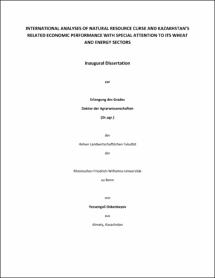Oskenbayev, Yessengali: International analyses of natural resource curse and Kazakhstan’s related economic performance with special attention to its wheat and energy sectors. - Bonn, 2015. - Dissertation, Rheinische Friedrich-Wilhelms-Universität Bonn.
Online-Ausgabe in bonndoc: https://nbn-resolving.org/urn:nbn:de:hbz:5n-40019
Online-Ausgabe in bonndoc: https://nbn-resolving.org/urn:nbn:de:hbz:5n-40019
@phdthesis{handle:20.500.11811/6241,
urn: https://nbn-resolving.org/urn:nbn:de:hbz:5n-40019,
author = {{Yessengali Oskenbayev}},
title = {International analyses of natural resource curse and Kazakhstan’s related economic performance with special attention to its wheat and energy sectors},
school = {Rheinische Friedrich-Wilhelms-Universität Bonn},
year = 2015,
month = sep,
note = {The bottom line of this study is to examine the role of natural resource endowments for economic growth and institutional quality with special focus on Kazakhstan and CIS countries. It is documented that resource rents share in income has a negative effect on institutional quality and thus undermines economic growth. Comparing two subsamples, during 1990-2000 and 2001-2010, we find evidence that direct resource curse impact may disappear while indirect one (through institutional quality) is persistent for all subsamples implying that resource curse via institutions provides a much more important link between natural resources and economic growth. Our findings suggest that the impact of the resource abundance deteriorates institutional quality, which in turn hampers economic growth.
The other objective of the study is to show that the natural resource abundance is a nonlinear function of the institutional quality. Above a certain threshold the natural resource abundance affects institutional quality adversely implying that excessive or overabundant production of resources are crucial in explaining the resources curse. Interestingly, for instance, diffuse resources such as agricultural resources bear positive externalities at higher levels of production, while at lower levels of production it could have negative impact on institutional quality.This significant adverse impact of the agricultural sector on institutional quality is in contrast to other studies. In addition, analysis of institutional arrangement reveals that the total effect of agricultural value added had a negative impact on institutional quality and economic growth, despite the squared term of agricultural value added exhibiting a positive impact on institutional quality and economic growth. Indeed, this has also been documented in analyses from Kazakhstan and other CIS countries. This is an implication that the agricultural sectors are dominated by state or large agricultural enterprises in these countries, and in this sense the sector can be regarded as a point-source resource sector. The dominance of large agricultural enterprises or state companies has negatively influenced the progress of reforms; for instance, land property rights are not enacted or established in almost all of the CIS countries.},
url = {https://hdl.handle.net/20.500.11811/6241}
}
urn: https://nbn-resolving.org/urn:nbn:de:hbz:5n-40019,
author = {{Yessengali Oskenbayev}},
title = {International analyses of natural resource curse and Kazakhstan’s related economic performance with special attention to its wheat and energy sectors},
school = {Rheinische Friedrich-Wilhelms-Universität Bonn},
year = 2015,
month = sep,
note = {The bottom line of this study is to examine the role of natural resource endowments for economic growth and institutional quality with special focus on Kazakhstan and CIS countries. It is documented that resource rents share in income has a negative effect on institutional quality and thus undermines economic growth. Comparing two subsamples, during 1990-2000 and 2001-2010, we find evidence that direct resource curse impact may disappear while indirect one (through institutional quality) is persistent for all subsamples implying that resource curse via institutions provides a much more important link between natural resources and economic growth. Our findings suggest that the impact of the resource abundance deteriorates institutional quality, which in turn hampers economic growth.
The other objective of the study is to show that the natural resource abundance is a nonlinear function of the institutional quality. Above a certain threshold the natural resource abundance affects institutional quality adversely implying that excessive or overabundant production of resources are crucial in explaining the resources curse. Interestingly, for instance, diffuse resources such as agricultural resources bear positive externalities at higher levels of production, while at lower levels of production it could have negative impact on institutional quality.This significant adverse impact of the agricultural sector on institutional quality is in contrast to other studies. In addition, analysis of institutional arrangement reveals that the total effect of agricultural value added had a negative impact on institutional quality and economic growth, despite the squared term of agricultural value added exhibiting a positive impact on institutional quality and economic growth. Indeed, this has also been documented in analyses from Kazakhstan and other CIS countries. This is an implication that the agricultural sectors are dominated by state or large agricultural enterprises in these countries, and in this sense the sector can be regarded as a point-source resource sector. The dominance of large agricultural enterprises or state companies has negatively influenced the progress of reforms; for instance, land property rights are not enacted or established in almost all of the CIS countries.},
url = {https://hdl.handle.net/20.500.11811/6241}
}






